16+ Sample Real Estate Fact Sheet
-
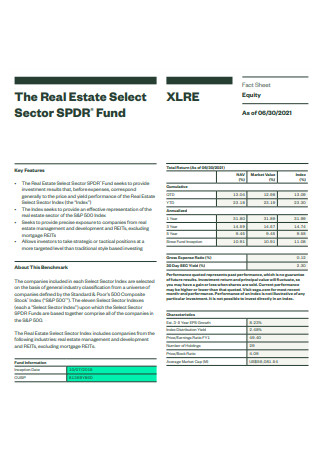
Real Estate Equity Fact Sheet
download now -
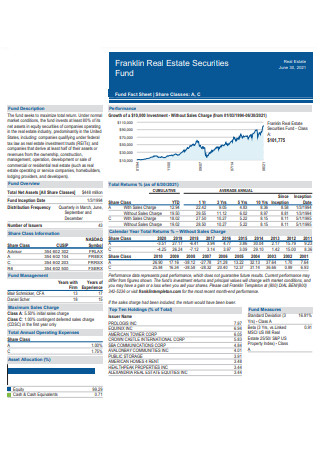
Real Estate Securities Fund Fact Sheet
download now -
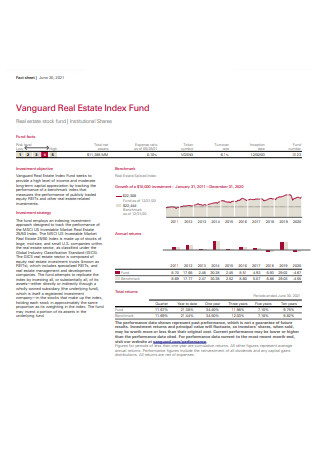
Real Estate Index Fund Fact Sheet
download now -
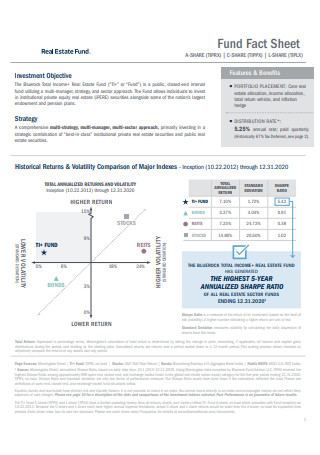
Real Estate Fund Fact Sheet
download now -
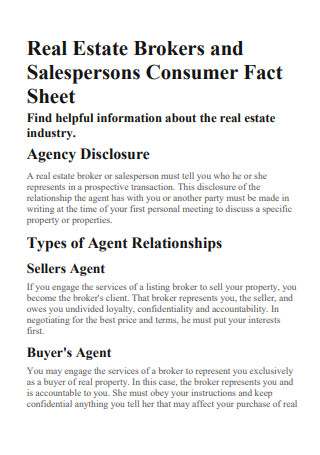
Real Estate Brokers and Sales Person Consumer Fact Sheet
download now -
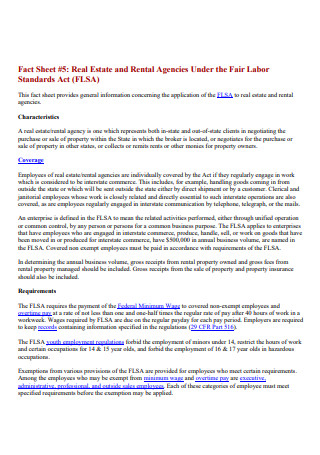
Standard Real Estate Fact Sheet
download now -
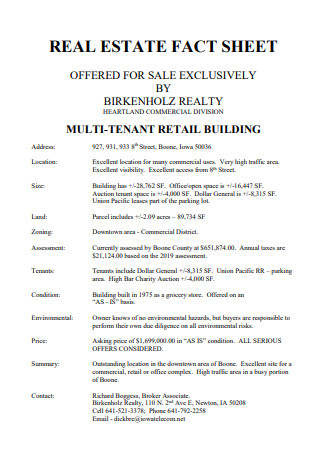
Real Estate Fact Sheet Example
download now -

Real Estate Geographic Targeting Orders Fact Sheet
download now -
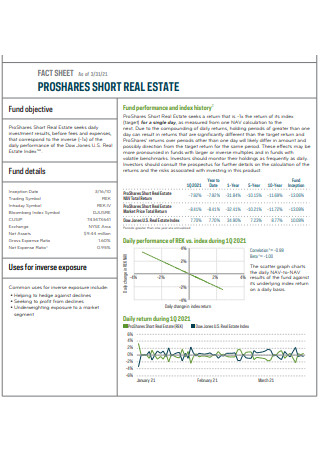
Shares Real Estate Fact Sheet
download now -
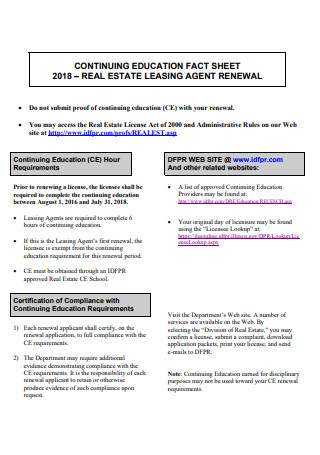
Real Estate Leasing Agent Renewal Fact Sheet
download now -
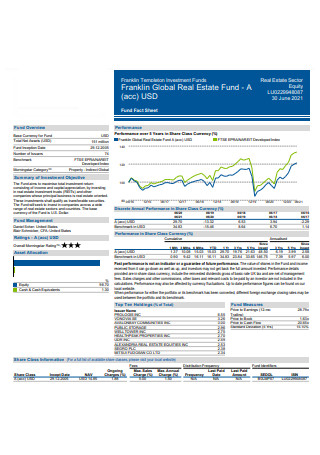
Global Real Estate Fund Fact Sheet
download now -
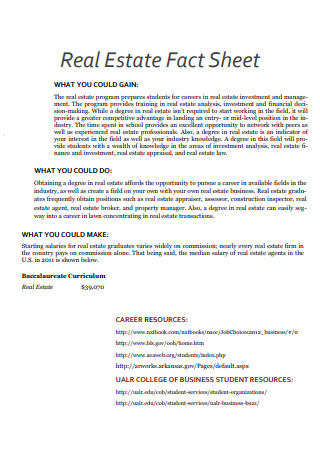
Real Estate Fact Sheet in PDF
download now -
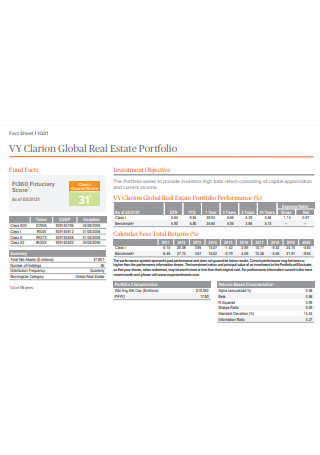
Global Real Estate Fact Sheet
download now -
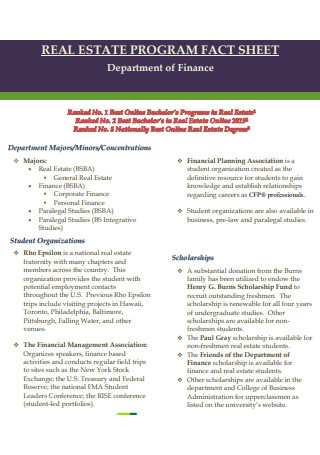
Real Estate Program Fact Sheet
download now -
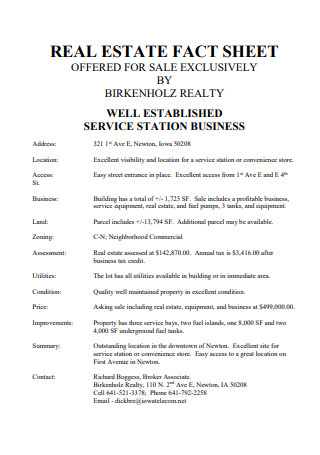
Printable Real Estate Fact Sheet
download now -
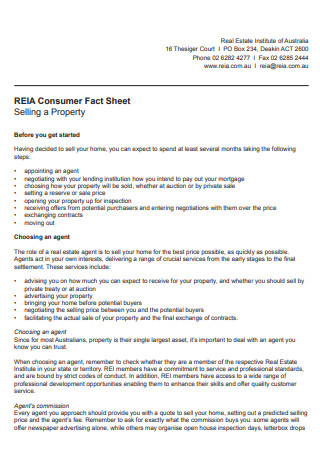
Real Estate Consumer Fact Sheet
download now -
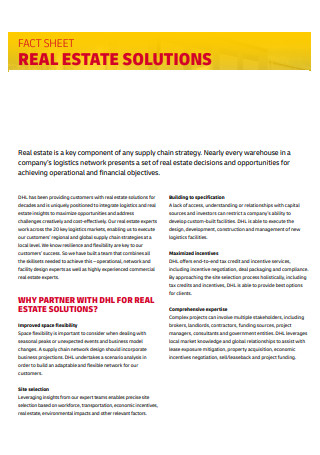
Real Estate Solutions Fact Sheet
download now
FREE Real Estate Fact Sheet s to Download
16+ Sample Real Estate Fact Sheet
What Is a Real Estate Fact Sheet?
How Real Estate Works
How to Write a Real Estate Fact Sheet
Importance of a Fact Sheet
Reasons to Work with a Real Estate Agent
FAQs
Why create a fact sheet?
What is the advantage of real estate investment?
What not to include in a fact sheet?
What Is a Real Estate Fact Sheet?
A real estate fact sheet can be a flyer that contains property information. The Flyer is intended to market important details about the home, such as its characteristics and pricing. Buyers may discover more about the home right away without waiting for the realtor to return their calls or referring to the sheet after a long day of open houses. Use a template or a blank document to make the flyer. Put yourself in the buyer’s shoes while writing your fact sheet to anticipate property facts you would want to know. There are also available real estate fact sheet examples that you can use as a reference when writing your own.
How Real Estate Works
Real Estate has many aspects. It has the ability to improve from a state of being unimproved to a state of being better. It is available for buy or sale. It might be held by the government, a corporation, or a private individual. However, certain elements can have a direct influence on the economy, such as constant land improvement and the individuals and institutions that enable ownership transfers. In general, real estate is beneficial not just to the buyer but to the surrounding community as well. In gaining property rights, they receive a title of ownership over the land, for improvements or natural resources that go with it.
How to Write a Real Estate Fact Sheet
A real estate Property Fact Sheet may be challenging to some who do not know how to begin making their own. You might think there is too much crucial information that you would want to include in the fact sheet and end up spending way too much time thinking that over. Take a pause and instead go over these steps that we have provided for you so you would know which section is more relevant than the rest. Provided in this article is a real estate information sheet template that you can utilize as much as you like or find suitable for your use.
Step 1: Add a Header
Your fact sheet’s title is determined by the heading. To capture your target audience’s attention right away, use a strong headline and a captivating image. Create a catchy headline. In using a headline, you are able to attract the buyer’s attention. Concentrate on the home’s best selling point. If you live in a quiet area, for example, your headline could use that as a selling point.
Step 2: Include Company Description
Begin your fact sheet with the name of your firm and a brief explanation of what it does. Add some basic information about your Real Estate Business, such as your office locations, total staff count, year of establishment, industry, and so on. Please feel free to include any other pertinent information about your product, service, or business. Include your or your real estate agent’s contact information. If you are selling the house yourself, include your name and phone number; otherwise, give your agent’s contact information. You may even tell the narrative of how your company came to be, who founded it, and why they started it.
Step 3: Describe the Property
Write a brief description of the property in a paragraph. Emphasize aspects that may entice potential purchasers. Discuss the home’s design, age, and any updated appliances or recent improvements, for example. Concentrate on the qualities that set your house apart from others on the market. Set the tone for the customer or use simple, straightforward language. Include any relevant information regarding the property, as well as asking the Price List. Divide the datasheet into sections or use bullet points to summarize information to elaborate. Find out about the house’s construction, condition, flooring, square footage, number of bedrooms and bathrooms, lot size, land, location, and basement.
Step 4: Include Photos
Include a recent photo of the home’s exterior. The best photos are those that are fully colorized. If you still have enough space, you can provide photographs of the interior setting of the home. It is important to include photos in your fact sheet because it will undeniably attract potential buyers into checking out your fact sheet. The more drawn they are into picking up the real estate fact sheet, the more you are able to persuade them into buying a property from your agency. You can include a Photo Licensing Agreement to guarantee the copyright protection regarding the property you are showcasing.
Step 5: Include Milestones
This is a crucial section of your fact sheet. Include significant achievements and milestones. Sales, expansion, and fundraising rounds are just a few examples. To make evaluating simpler, include all of the significant milestones in bullet points. You can include additional information such as key metrics, customer segments, and end the fact sheet by providing your contact information, such as a phone number, email address, and Social Media accounts, which can be used by your audience to get in touch with you.
Step 6: Print Copies
Multiple copies should be printed on high-quality paper. For a professional appearance, use a glossy finish. Place a dozen papers in a weather-proof box or tube beside your property’s “For Sale” sign. As needed, replenish the sheets. When your house is being seen, place a stack of fliers by the front door or a reception area in your company building.
Importance of a Fact Sheet
Now that you know what a fact sheet is, it’s time to learn why it is important and what part it plays in a company’s success. Read on this section of the article to know more about how a fact sheet plays in ensuring the success of your company’s product or service.
Reasons to Work with a Real Estate Agent
When it comes to house sales, buyers and sellers are on opposite sides of the fence. What one wants to achieve is frequently diametrically opposed to what the other wants to see happen—the first generally wants to steal the property, whereas the second wants top cash. Despite this, their ultimate objective is the same. They want to make a profit. Both parties can gain considerably from retaining the services of a real estate agent, but their motivations may differ.
FAQs
Why create a fact sheet?
Fact Sheets on a product or service can be created for sales and marketing teams to give to clients, partners, or prospects. As an introduction to investors, a startup fact sheet might be created. Internal reporting can be done with fact sheets. Human resource fact sheets for organizations. Fact sheets may be used as both marketing and sales enablement materials. Fact sheets on public relations and media relationships may give journalists all the information they need to write about you. Fact sheets are important for all sizes of businesses and have a wide range of applications. However, you should always be clear about the objective of a fact sheet and who it is intended for before developing one. Only then will you be able to develop an educational information sheet that your readers will like.
What is the advantage of real estate investment?
Passive income, consistent cash flow, tax advantages, diversification, and leverage are all advantages of real estate investing. REITs are a type of real estate investment trust that allows you to invest in real estate without having to own, run, or financial assets. If you are really curious, you may want to tap into a real estate datasheet and see for yourself the rates of success in real estate investment.
What not to include in a fact sheet?
Since fact sheets are commonly fitted into one page, you should practice and prioritize important information. Avoid adding unnecessary information that holds no relevance for your target audience. Since a Real Estate fact sheet acts as a real estate info sheet, you have to know what information is most relevant and should be known by the public audience while not overloading them with information. Feel free to view the provided real estate fact sheet sample to compare an actual fact sheet and see the necessary information to add to the sheet.
Clients who know and have background knowledge on real estate investment will encourage them to push through with the decision. Additionally, with the real estate fact sheet, you are able to concisely store all the relevant information that your clients need to know without bombing them with too much information.
